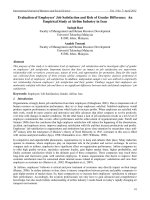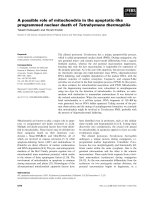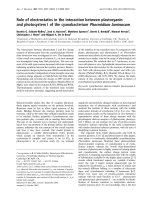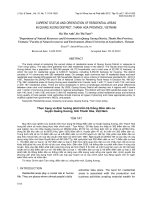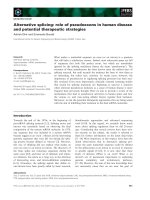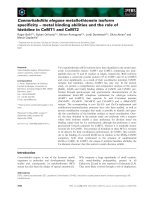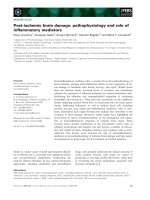Status and role of human in Buddhism
Bạn đang xem bản rút gọn của tài liệu. Xem và tải ngay bản đầy đủ của tài liệu tại đây (525.5 KB, 6 trang )
STATUS AND ROLE OF HUMAN IN BUDDHISM
Lamngeune Souliyavong1
Puttharak Prabnok2
1
Ph, D. (candidate) in Philosophy Program in Doctor of Philosophy in Eastern
Philosophy and Religion.
1,2
Faculty of Humanities and Social Sciences, Khonkaen University, Thailand
Abstract
The paper present the teaching about status and roles of human in society can be
called life charter of people in society according to Buddhism because these principles
cover living a life of people having status in society. This means relationship between
parents-children and husband-wife is in family status. In addition, relationship between
employer-employee and within friends is in social status. Further, relationship between
teachers-pupil is in educational status, and relationship between priests–residents is in
religious status. So, this Buddhist doctrine is good core of living a life or life charter to
have people living in unity in different status. If the above mentioned institutions conduct
their duties seriously, it will make the institutions be happy. When an individual acts to be
treated in accordance with the tenets of this doctrine, it will make a peaceful society.
Key words: Status, Role, Human, Buddhism
1. Introduction
The word ―society‖ defines the relationships between people in society, without
defining it in other forms, not for economy nor politics etc. because different phenomenon
that occurs as a growth or a decline in society are the result of the relationship between the
people totally. Being member will determine the functional status of a person in society.
One could say that each society has a social relationship i.e. status and role or function.
Everyone has a different status in society. The role is rooted in the state. Status refers to the
particular rights and obligations of person involved with other people and society making
that person different from others. The role means that individual rights and fulfills their
duties in their existing positions. The role of people in society depends on its regular
position because status and role are inseparable. When we have status, we habitually be in
relationship with others and the role for that person.
2. Status and Role of Human in Buddhism
Status and role and responsibilities of each person in society are prescribe or rules
of each individual along with teaching in Buddhism. The Buddhist doctrine presented here
is doctrine of 6 relationships. These are the principle that fixes the status and role of the
person who should be treated with a total of 6 pairs including parents - children, husband wife, teacher - pupil, friend - friends, boss - subordinate, and priest - villagers. Each pair
will have to follow the position and the roles that they have faith in it to prevent damage to
persons or direction.
506
In fact, This doctrine presents doing owns‘ job with sincerity to prevent damage to
the direction where one should perform‖ with specifying the 6 statuses and functions of a
person in society and use the term direction as follows:
3. Parents and Children
Parents are first teacher, raiser and do everything for their children before others. So
why, it is called Front direction. According to the teachings of Buddhism, it prescribes the
roles between parents and children as follows:
Parents should have following roles to their children:
1) Cautioning and protecting them from evil.
2) Nurturing and training them in goodness.
3) Providing them with an education.
4) Seeing to it that they obtain suitable spouses.
5) Bequeathing the inheritance to them at the proper time.
Parents have a duty to treat the children first. Although parents don‘t expect
anything back from children, they will raise children with love, hope of affecting the
mind's growth, and hope for prosperity of their children‘s life. When above mentioned
duties are done, it is known to act completely.
Children are base in supporting mankind. Children in family are children in society.
They should be been trained to have self-value which would make advance in the study
and to develop their own lives and be a valuable member of society. So, according to
teachings in Buddhism, as a son or daughter, one should honor one‘s parents as follows :
1) Having been raised by them, one looks after them in return.
2) Helping them in their business and work.
3) Continuing the family line.
4) Conducting oneself as is proper for an heir.
5) After their passing away, one make offering, dedicating the merit to them.
When children grow up, they must achieve a state of their own that they are
currently in existence today because of the generosity of the parents. After thinking of this,
they must treat 5 kinds as mentioned above completely. If there is defect or refusal to acts,
Thai society will not accept that and called an ingrate or ungrateful. This means, person
who doesn‘t know obligation and reprisal is repulsive and undesirable. Meanwhile,
children who know gratitude to the person who patronizes before especially parents believe
to be a good people. It is considered as an important virtue in society and makes society be
a unique and is known as the benefactor of others who have done little despite himself
somehow. This is because of the tenets of the religion itself.
4. Teachers and students
In Buddhism, being teachers gets a very high status because it is expected from
society as those who create intellectual knowledge to the youth of the nation. Teachers are
507
important and teaching is a noble profession which gets the respect of people in society.
Besides giving knowledge, the duty of teachers is to train ethics for students as well. The
moral of the teachers that society expects is merciful kindness for per pupil, which is
different from the virtues of the parents. So, the status of teachers in society is important
vice from parents as mentioned already. According to the teachings of Buddhism, A
teacher supports his students by;
1) Teaching and training them to be good.
2) Guiding them to thorough understanding.
3) Teaching the subject in full.
4) Encouraging the students and praising their merits and abilities.
5) Providing a protection for all directions; that is, teaching and training them so
that they can actually use their learning to make a living and know how to conduct
themselves well, having a guarantee for smoothly leading a good life and attaining
happiness and prosperity.
When teachers treat students as mentioned, student must have a code of conduct for
the teachers by;
1) Rising to greet the teacher and shows respect to them.
2) Approaching the teacher to attend him, serve him, consult him, query him,
receive advice from him.
3) Hearkening well so as to cultivate wisdom.
4) Serving the teacher and runs errands for him.
5) Learning the subject respectfully and earnestly, giving the task of learning its due
importance.
The relationship between students and teachers brings prosperity only for them.
That means, students will obtain decent knowledge and defended by teachers. As for
teachers, they will maintain a comfortable lifestyle with no troubles about the well-being or
existence. Students in Thailand have greatly respected teacher because teachers are
knowledge givers to be self-employed. Therefore, they are not different from parents.
Society has tradition to express appreciation to the teachers. So the moral views of society
as a disciple is the same with moral piety towards parents. Any student who does not
appreciate his teacher, that pupil will be undesirable and unwanted of society because that
pupil is unappreciative or ungrateful. Moral sense and feelings are influenced of the
teachings of Buddhism.
4. Husband and Wife
In the past, husband was the head of the family and earned a living and took care of
family. As for wife, she looked after the children and didn‘t household works. According
to the tenets of Buddhism, it specified the duties of conduct between husband and wife, as
follows. As husband, one should honor and support one‘s wife by;
508
1) Honoring her in accordance with her status as wife.
2) Not looking down on her.
3) Not committing adultery.
4) Giving her control of household concerns.
5) Giving her occasional gifts of ornaments and clothing.
When husband treated wife as already mentioned, wife also has a duty to conduct a
husband by;
1) Keeping the household tidy.
2) Helping the relatives and friends of both sides.
3) Not committing adultery.
4) Safe guarding any wealthy that has been acquired.
5) Being diligent in all her work.
If husband and wife treated each other along with doctrine, it would make the
family happy because each partner acts against each other with courtesy. But divorce is
more common today‘s society because neither side defect their duty, especially modern
society focus on equality between men and women. Women ought to make a living; side
by side with men claiming that working alone is not enough to eat causing women have to
work hard both outdoors and indoors. Many married couples face this problem. In youth
with children, letting wife takes care of children without working outside the home is
better than hiring a nanny in all other cases because mother can take good take care of
children more than nanny who comes to work for more money. Neglecting
duties/responsibilities is creating various family problems.
6. Friend and friend
Friendship is important and affects the growth and decline of a good life.
Fellowship should have quality of being a true friend, not artificial.
If there is sincerity within friends, support one another, and behave very well, the
society will be peaceful without squabbles and there will be no taking advantage from one
another. But today's world is not like this. There is no complementary. They don‘t behave very
well. Besides these, they destroy mutual benefits and prominent people. This is why present
society is in trouble. As a friend, one should conduct oneself toward one‘s friends by;
1) Sharing with them.
2) Speaking kindly to them.
3) Helping them.
4) Being constant through their ups and downs.
5) Being faithful and sincere.
When a friend is treated by above duties, one should treats in return as follows:
1) Protecting their friend when he is off guard.
2) Protecting their friend‘s property when he is off guard.
3) Being a refuge in times of danger.
4) Not deserting their friend in times of hardship.
5) Respecting their friend‘s family and relatives.
509
7. Employer and employees
When employers aid employees, workers or employees will help in different works
so that employers can perform well. Besides, employers will feel comfortable when
employees work with integrity, diligently. So, duties of both employer and employee are
giving mutual support to each other.
According to the teachings of Buddhism, it specified duties of workers and
employers or servants as follows:
As an employer, one should support one‘s servants and employees, who are likened
to the lower direction as follows:
1) Assigning their work in accordance with their strength, sex, age and abilities.
2) Paying them wages commensurate with their work and adequate for their livelihood.
3) Granting them fringe benefits by, for example, providing medical care in times of
sickness.
4) sharing with them a portion of any extra gain.
5) Give them appropriate holidays and time to rest.
When workers and employees are treated, they must treat employer by;
1) Starting work before employer.
2) Stopping work after employer.
3) Taking only what is given by his employer.
4) Doing his job well and seeking ways to improve on it.
5) Spreading a good reputation about his employer and his business.
8. Priest and residents
Religion is necessary for every society because it is the anchor of the soul of people
in society. Individuals must have relation to the priests. It is the duty of the priests
preaching to people the best advices. Live a life in right and simple way. So, Buddhism
specified duties of priest in one direction from 6 directions because religion is important
for human life.
Priest means people who hold percepts because the priest practices to be refined
from sufferings and to be pure from desires, lust. People who are practicing to be out of
lust, and suffering are considered as a noble man. Being a noble man is considered to be
superb so why normal people put them upward to pay respect.
According to the tenets of Buddhism, priest should have following duties towards
residents by;
1) Enjoying them from evil actions.
2) Enjoying them in goodness.
3) Assisting them with kind intentions.
4) Making known to them things not heard before.
5) Explaining and clarifying things they have already heard.
6) Pointing out the way to heaven, teaching them the way to happiness and
prosperity.
510
Residents also have duties towards priest. The duties are as follows:
1) Acting towards them with goodwill.
2) Speaking to them with goodwill.
3) Thinking of them with goodwill.
4) Receiving them willingly.
5) Supporting them with food, robes, shelter and medicine.
Residents who perform their duties as mentioned above refer that they take care of a
priest to live happily, without affected by four factors. Priest can concentrates on the practice of
religious activities. Likewise, when priests have been supported, they have a duty to help
residents with the discipline to live the right way. When both priests and residents follow their
duties correctly, it will inevitably lead to the happiness of both parties.
9. Conclusion
In present, the society has changed a lot. Awareness about roles along with status in
society of people are decreasing, whether it's the teachers, students, parents, employers,
employees, friends, priests and worshippers. They are not performing their duties
completely. This is due to the changing lifestyle in today's world resulting the changes in
the social structure too. It is to be found that the teachings of Buddhism will only exist in
scripture. People in society are not taken seriously in any way. Ultimately, it is the ideal
that no man put into practice and become obsolete or archaic inevitable. But if people of all
social duties are correctly positioned society would not have so many problems as today,
certainly. It is like the words admonish that any dharma will be worthy if it is implied, any
dharma will be worthless if it is not implied.
10. References
1. Csoma, A. The Life and Teachings of Buddha. India: Calcutta University
Press, 1957.
2. Hardy, R.S. A Manual of Buddhism, India: Motilal Baranasi, 1967.
3. P.A. Payutto. A constitution for living. Bangkok: Amarin Book Center, 2000.
4. Walters, John. The Essence of Buddhism. New York: Thomas Y. Crowell
Company, 1961.
5. Well, K.E. Thai Buddhism, Its rites and activities. Bangkok: The police
Printing Press, 1960.
511
